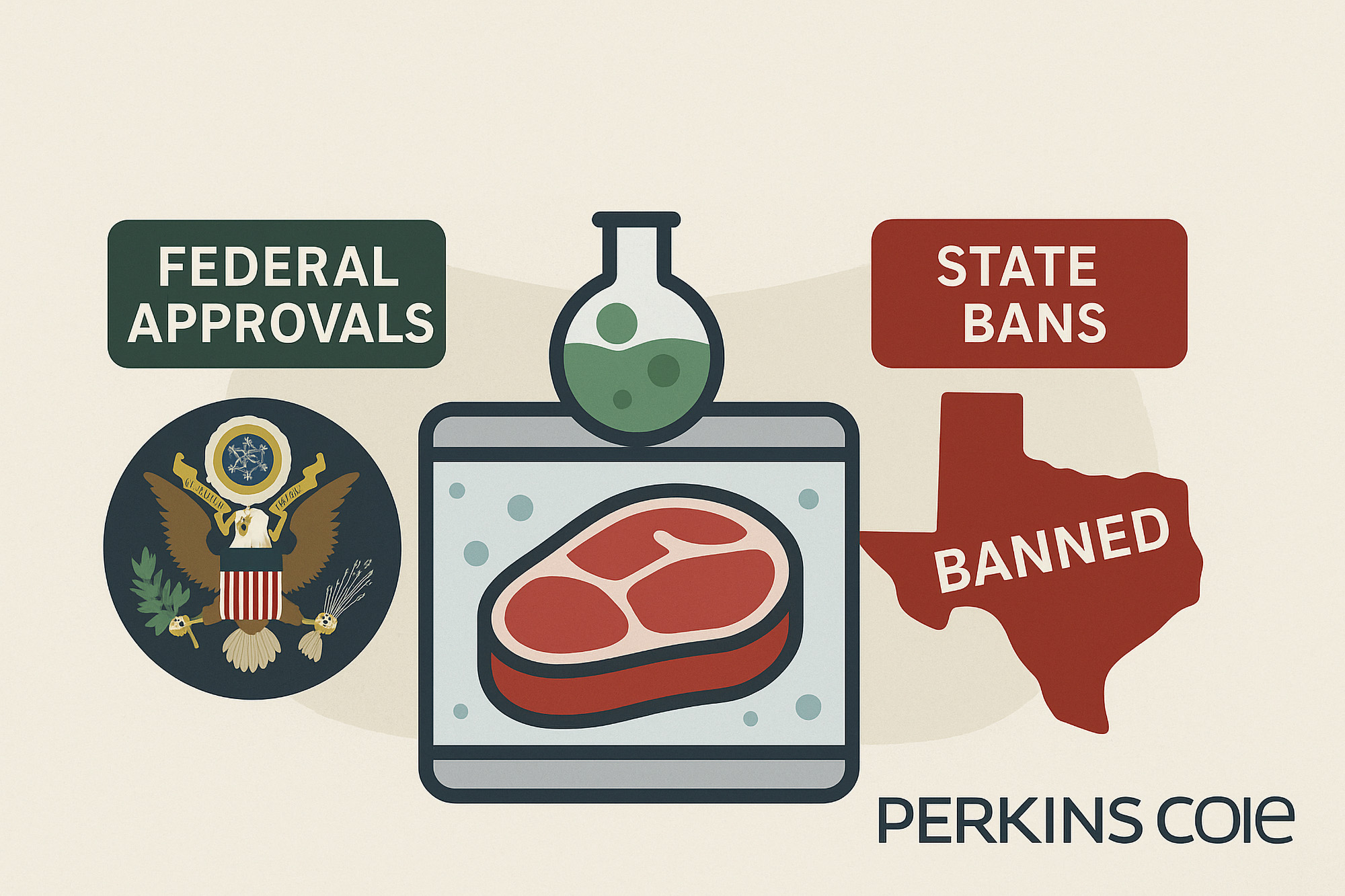

Perkins Coie outlines cultivated meat’s uneven regulatory landscape
The US regulatory environment for cultivated meat is evolving rapidly but unevenly, with federal approvals advancing even as state legislatures enact bans or impose labeling requirements. That’s the conclusion of a new analysis from Perkins Coie, where attorneys Thomas (Tommy) Tobin and Evan Molineux examined recent legal developments shaping the emerging sector in their 18 August 2025 blog post Cultivated Meat Snapshot: Recent Federal and State Actions.
Cultivated meat, also referred to as cell-cultured meat, is grown from animal cells in a controlled environment. Producers begin by taking a sample from a living animal, placing the cells in conditions that support their growth, and, in some cases, adding growth factors or edible scaffolds to encourage development into muscle, fat, and connective tissue. The result is billions of cells multiplying into meat tissue without raising or slaughtering animals.
At the federal level, oversight is shared by the US Food and Drug Administration (FDA) and the US Department of Agriculture (USDA). The FDA reviews the safety of cultivated meat production processes, while USDA is expected to oversee labeling and inspection as products enter the marketplace.
On May 28, 2025, the FDA issued a 'no questions' letter to San Francisco-based Wildtype, Inc. for its cultivated salmon. As Tobin and Molineux note, this letter indicates the agency had no further questions regarding Wildtype’s safety determination for the product’s intended use, clearing the way for potential commercialization. It is the first such letter issued for a cultivated seafood product and the fourth overall for cultivated meat. Previous letters have covered chicken and pork.
Perkins Coie emphasizes that these federal approvals reflect regulators’ willingness to treat cultivated meat as a legitimate food category. Each “no questions” letter signals that a company’s safety submission meets FDA expectations, an important step before products can reach US consumers.
While federal agencies advance pathways for cultivated meat, several states are moving in the opposite direction. On June 20, 2025, Texas Governor Greg Abbott signed Senate Bill 261, banning the manufacture, processing, possession, distribution, or sale of cell-cultured protein in the state beginning September 1.
The law defines cell-cultured protein as food “derived from harvesting animal cells and artificially replicating those cells in a growth medium to produce tissue.” With this action, Texas became the latest state to prohibit cultivated meat, joining Alabama, Florida, Indiana, Mississippi, Missouri, Montana, and Nebraska.
According to Perkins Coie’s analysis, these measures reflect concerns among legislators about consumer protection, market disruption, and the future of traditional livestock industries. The bans also highlight the fragmented environment companies face as they attempt to bring products to market.
Not all states have chosen outright bans. Some are focusing on labeling requirements to govern how cultivated meat is described at retail. Missouri was the first to regulate terminology through SB 627, which prohibits misrepresenting a product as meat if it does not come from conventionally harvested livestock or poultry.
Iowa enacted similar labeling rules with SF 2391. And in February, the North Carolina General Assembly introduced H.B. 134, which would require companies to clearly indicate on packaging that products are cell-cultured.
Tobin and Molineux point out that such labeling laws highlight the ongoing debate over terminology. Supporters of stricter rules argue that they prevent consumer confusion, while advocates for cultivated meat contend that the term 'meat' is biologically accurate given the cellular composition of the products.
Perkins Coie’s blog makes clear that the regulatory picture is far from settled. At the federal level, the combination of FDA “no questions” letters and pending USDA labeling oversight creates a framework for commercialization. But at the state level, the landscape is split between jurisdictions that block cultivated meat outright and those that regulate its labeling.
This patchwork approach poses challenges for producers. Federal clearance is necessary but not sufficient for nationwide sales, meaning companies must navigate different rules depending on the state. For consumers, the result may be limited access in certain regions and a lack of consistency in how products are presented.
The Perkins Coie analysis underscores how cultivated meat sits at the intersection of innovation, regulation, and politics. The FDA’s clearance of Wildtype salmon represents an important milestone for the sector, expanding cultivated meat approvals beyond land-based proteins. Yet the simultaneous rise of state-level bans illustrates the resistance the industry faces, particularly in agricultural states with strong livestock interests.
As Tobin and Molineux conclude, the regulatory environment for cultivated meat remains highly dynamic, with significant variation across states and ongoing federal oversight. For companies, investors, and consumers, the key challenge will be navigating this fragmented legal landscape as the first wave of products reaches the market.
If you have any questions or would like to get in touch with us, please email info@futureofproteinproduction.com


-p-800.jpg)



